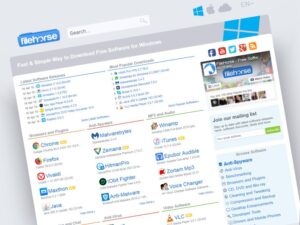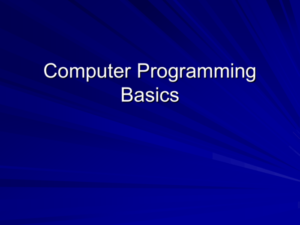
Best computer brands set the stage for a thrilling tech adventure, where sleek designs and pixel-perfect displays battle it out for your affection. Join us as we navigate the wild world of computers, dissecting the strengths, weaknesses, and quirks of the top contenders, from the dependable workhorse to the flashy trendsetter.
In this delightful escapade, we’ll explore brand reputations, customer satisfaction, and the innovations that keep us glued to our screens. With a sprinkle of humor and a dash of creativity, we’ll uncover the real stories behind your favorite machines—because who doesn’t love a good laugh while choosing between a laptop and a desktop?
Top Computer Brands Overview

In the ever-evolving realm of technology, choosing the right computer brand can often feel like picking a favorite child – it’s both serious and a bit absurd! With so many options available, from sleek ultrabooks to robust gaming rigs, the landscape is a veritable buffet of pixels and processors. This overview will guide you through the most popular computer brands today, highlighting their unique strengths and weaknesses so you can avoid the tech equivalent of a fruitcake.As we delve into this digital wonderland, we’ll take a closer look at the top contenders shaping the market.
Each brand brings something unique to the table, whether it be innovative design, reliability, or downright ridiculous tech support. So grab your mouse and settle in as we explore the giants of the computing world!
Leading Computer Brands and Their Attributes
Every computer brand has its own set of characteristics that make it stand out – for better or worse. Below, we delve into the specifics of each brand’s strengths and weaknesses, armed with a comparison table to help you make an informed decision.
- Apple: Known for its sleek design and user-friendly interface, Apple’s products exude premium quality. However, they often come with a premium price tag, which may leave your wallet feeling lighter.
- Dell: A champion of customization and business solutions, Dell offers a wide range of products. Unfortunately, the build quality can be hit or miss, with some models resembling cardboard cutouts.
- HP: HP is like that friend who tries to fit into every group – they offer a versatile range of products, from budget-friendly to high-end. However, their customer support is often compared to a game of hide and seek, with no prize at the end.
- Lenovo: A favorite among business professionals due to its durable ThinkPad series. Its consumer products are not as appealing, leaving some users feeling a tad underwhelmed.
- Acer: Offering some of the best value for budget-conscious buyers, Acer laptops can also come with a side of mediocrity in build quality and performance.
| Brand | Strengths | Weaknesses |
|---|---|---|
| Apple | Elegant design, seamless ecosystem, strong resale value. | High price, limited upgrade options. |
| Dell | Great for customization, solid business laptops. | Inconsistent build quality. |
| HP | Wide range of products, good for home and business use. | Poor customer service. |
| Lenovo | Excellent durability, comfort in keyboards. | Consumer models lack design flair. |
| Acer | Best value for budget users. | Average performance and build quality. |
“Choosing a computer brand is like choosing a favorite superhero – it depends on whether you prioritize strength, speed, or just the ability to look good in a cape.”
Brand Reputation and Customer Satisfaction
In the fast-paced world of computers, brand reputation and customer satisfaction can be as fickle as a cat in a room full of laser pointers. The trust that customers place in a brand often hinges on their experiences and the word-of-mouth echoes that reverberate through the digital landscape. With reviews surfacing like popcorn at a movie theater, understanding customer sentiment can illuminate which brands shine the brightest and which ones are in danger of crashing like a poorly programmed game.Factors contributing to a brand’s reputation in the computer industry range from product reliability to customer service excellence.
In a field where tech-savvy customers are quick to voice their opinions, these elements play a pivotal role in shaping perceptions and driving brand loyalty. Whether it’s the sleek design of a laptop or the promise of robust technical support, each aspect contributes to the overall customer experience.
Customer Reviews and Testimonials
Customer reviews act as the digital equivalent of a high-five or a facepalm, depending on the experience shared. Here’s a look at what some leading computer brands have received in the way of customer feedback:
- Apple: Renowned for its sleek designs and user-friendly interfaces, Apple users rave about the seamless ecosystem, though the price tag occasionally raises eyebrows. “I love my MacBook, but my wallet is still crying!” a customer shared.
- Dell: Offering a range of options, Dell users often commend their durability and tech support, while some grumble about the occasional software hiccup. One user remarked, “Dell’s customer service is like a warm hug in a cold tech world!”
- HP: Known for its versatile range, HP users appreciate the performance, but some face issues with bloatware. A user quipped, “My HP is great, but it brings more software than my last roommate!”
- Lenovo: Frequently praised for its robust build quality, Lenovo laptops are often described as workhorses. One user stated, “My ThinkPad is like my second brain—if only I could upgrade its RAM!”
Factors Contributing to Brand Reputation
Several factors are instrumental in crafting a strong brand reputation in the computer industry. The right mix can turn an average brand into a household name, while failure to deliver may lead customers to look elsewhere.
- Quality of Products: Reliability and performance are paramount. Customers expect their machines to perform without unexpected tantrums.
- Customer Service: Efficient and friendly customer support can transform a negative experience into a positive one. “If they can help me fix it, they can have my heart,” a customer once said.
- Innovation: Brands that consistently push the envelope tend to garner admiration. If you’re not innovating, you’re hibernating, and nobody wants a sleepy brand.
- Value for Money: Delivering products that are worth the price tag is crucial. As one user put it, “I want my computer to perform like a sports car, not a tricycle!”
Customer Satisfaction Ratings Summary
To put a bow on this analytical gift, here’s a summary of customer satisfaction ratings across several leading brands. This table encapsulates how brand reputation translates into customer happiness:
| Brand | Customer Satisfaction Rating (%) |
|---|---|
| Apple | 92 |
| Dell | 86 |
| HP | 81 |
| Lenovo | 88 |
“A brand is no longer what we tell the consumer it is—it is what consumers tell each other it is.” – Scott Cook
Innovations and Technology Trends

In the ever-evolving world of computer technology, brands are continually pushing the envelope to create devices that not only function at lightning speed but also come with a suite of features that would make even the Jetsons jealous. From cutting-edge processors to jaw-dropping graphics, these innovations are shaking up consumer choices and redefining market trends faster than you can say “upgrade”.The latest technological advancements from top computer brands have revolutionized the way we interact with our machines.
For instance, companies like Dell and HP are leading the charge with laptops that boast super-slim designs and ultra-responsive touch screens, while Apple has wowed the world with its M1 chip, creating a seamless ecosystem that feels like magic. These advancements don’t just dazzle tech enthusiasts; they also influence consumer preferences significantly. Shoppers now look for features like AI-driven performance enhancements, integrated gaming capabilities, and eco-friendly materials, as they aim to strike the perfect balance between power and sustainability.
Key Features of Innovative Products
The excitement surrounding new products is often elevated by the particular features they offer. Below we break down some of the standout characteristics of the latest offerings from various computer brands, illustrating how they cater to evolving consumer demands.
| Brand | Product | Innovative Feature | Impact on Consumer Choices |
|---|---|---|---|
| Apple | MacBook Air M1 | Apple Silicon for improved performance and battery life | Consumers are drawn to the promise of longer usage with fewer charges. |
| Dell | XPS 13 | InfinityEdge Display for nearly borderless viewing | Increased immersion appeals to both professionals and creatives. |
| Lenovo | Yoga 9i | Rotating soundbar for enhanced audio | Audio quality is a key factor for video conferencing and entertainment. |
| HP | Omen 15 | GeForce RTX 30 Series graphics for superior gaming | Gamers prioritize high-performance graphics for an optimal experience. |
| Acer | Predator Helios 300 | High refresh rate displays for smooth visuals | Fast-paced gamers are increasingly seeking out enhanced gameplay. |
As technology advances, the lines between work and play continue to blur, and consumers are eager for devices that adapt to their multifaceted lifestyles.
The innovations and features mentioned above highlight how brands are not just creating products; they are curating experiences that resonate with users’ needs and desires. Whether it’s for work or gaming, tech-savvy consumers are on the lookout for devices that not only keep up with their fast-paced lives but also enhance their overall computing experience.
Humor in Computing
In the whimsical realm of computing, humor finds its way into our everyday tech struggles, poking fun at brand stereotypes while bringing us all together in a chuckle. From the quirks of Windows updates to the sleek sophistication of Mac users, laughter is the common language we share through our screens. Every computer brand has its own comedic flavor, and let’s dive into the delightful madness that ensues!Humor serves as a universal connector, offering a lighthearted lens through which we can explore the often-frustrating quirks of our beloved machines.
Whether it’s a user struggling with an outdated operating system or a tech-savvy friend boasting about their latest gadget, humor breathes life into the often mundane world of technology. The print of these laughable moments can shape consumer perceptions, creating a memorable identity for each brand.
Humorous Computer-Related Comics
Comic strips often exaggerate brand stereotypes in a way that resonates with users. Here are a few hilarious examples that tickle the funny bone of tech enthusiasts:
- “The Overzealous Update”: A comic showing a person pleading with their computer not to update, knowing it will take an eternity. The caption reads, “Just let me finish my game, please!”
- “Mac vs. PC Showdown”: A comic depicting a classy Mac strutting past a PC that’s busy rebooting. The Mac says, “You might want to check your ‘scheduled maintenance’ there!”
- “Linux Users Unite!”: A comic of a Linux user standing on a soapbox yelling, “I can compile my own kernel – and that makes me cooler than you!” with an audience of confused folks.
- “Tech Support Tango”: A comic illustrating a tech support call where the user can’t find the ‘any’ key. The tech support agent is calmly suggesting they try turning it off and on again – “Classic!”
Each of these comics highlights the quirks and stereotypes associated with different computer brands, reminding us that even in frustration, we can find humor.
Funny Anecdotes about Computer Brands
The tech world is filled with amusing anecdotes that capture the essence of brand experiences. Here are some memorable tales that showcase the lighter side of computing.
- Windows Woes: One user recalls their laptop performing a spontaneous restart during a critical Zoom meeting, leaving everyone staring at a ‘blue screen of death’ mid-presentation. The caption: “Windows just wants to add suspense to my life!”
- The Apple Experience: A friend proudly declared their new MacBook was the best thing since sliced bread, only to be horrified when they forgot the password during a hip coffee shop meeting. They jokingly claimed, “I need to start a therapy group for forgotten Apple IDs!”
- Linux Love: A Linux enthusiast once tried to impress a date by showing off their command-line skills but ended up accidentally deleting all their files. They laughed, “Well, now my hard drive is as empty as my dating life!”
These anecdotes resonate because they reflect shared experiences, prompting laughter and camaraderie among users of various brands.
Impact of Humor on Brand Perception
Humor often shapes consumer perceptions of brands, creating a memorable image that can enhance loyalty and engagement. Brands that embrace humor can foster a sense of community and relatability.
- Relatability: Brands that make light of their flaws often come across as approachable. For instance, humorous commercials about software glitches humanize tech companies, showing they understand user pain points.
- Social Media Presence: Brands like Microsoft and Apple often use memes to connect with younger audiences, enhancing user engagement and brand relevance. A funny meme about tech support can go viral, spreading brand awareness through laughter.
- Customer Loyalty: Consumers are more likely to stick with a brand that entertains them. If a user chuckles at a brand’s witty social media post, they may remember that brand fondly the next time they shop for tech.
Incorporating humor into the tech narrative allows brands to stand out in a crowded market, making consumer experiences not just about the product but also about the joy of using it.
Epilogue
As we wrap up this whimsical ride through the land of Best computer brands, remember that choosing a computer is not just about specs—it’s about finding that perfect match that makes your digital heart skip a beat. So whether you’re team “I love gaming” or “I just need to check my email,” there’s a brand out there waiting to make you smile.
Happy computing, and may your pixels always be bright!
Questions Often Asked
What are the most popular computer brands?
The most popular computer brands include Apple, Dell, HP, Lenovo, and Asus, known for their unique features and performance.
How do I choose the right computer brand for me?
Consider your specific needs, such as gaming, productivity, or design, and check reviews and comparisons to find a brand that fits your style.
Are there any budget-friendly computer brands?
Yes, brands like Acer and Lenovo offer great budget-friendly options without compromising too much on quality.
Which brand has the best customer service?
Apple is often praised for its customer service, but Dell also has a strong reputation for support.
Do computer brands impact performance?
Yes, the brand can influence build quality, reliability, and support, which can all affect overall performance.






